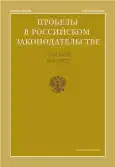The content of the constitutional and legal concept of "public policy" for the purposes of enforcing or cancelling an arbitral award
- Authors: Lyamport A.А.1
-
Affiliations:
- Lomonosov Moscow State University
- Issue: Vol 18, No 4 (2025)
- Pages: 120-126
- Section: Private Law (Civil) Sciences
- URL: https://journal-vniispk.ru/2072-3164/article/view/313160
- DOI: https://doi.org/10.33693/2072-3164-2025-18-4-120-126
- EDN: https://elibrary.ru/BSWDES
- ID: 313160
Cite item
Abstract
It is considered that the concept of ‘public policy’, as defined in the Arbitration Procedural Code of the Russian Federation and the Code of Civil Procedure of the Russian Federation, is presented as an example of the constitutionalisation of a branch norm. Despite the argument for the inclusion of fundamental principles in the Constitution of the Russian Federation, it remains challenging to identify examples of such fundamental principles of the Russian legal framework. To determine the fundamental principles, various scientific theories have been studied, including the axiological theory, which is associated with a certain hierarchy of constitutional norms, which, for example, depend on their social significance (for example, the value of rights and freedoms of citizens or the importance of a federal state). In a different approach, the unity of constitutional norms is recognized and it considers fundamental legal principles as in the whole constitution or a majority of constitutional provisions. The paper proceeds to analyze the strengths and weaknesses of the axiological theory. The search for an applicable methodology for determining fundamental legal principles (and consequently the content of ‘public policy’) depends on the selected approach to defining such factors as ‘constitutional identity’ and the socio-economic structure of society. The author also asserts the importance of studying the content of the concept of fundamental legal principles’ in the field of Russian law.
Full Text
##article.viewOnOriginalSite##About the authors
Alexander А. Lyamport
Lomonosov Moscow State University
Author for correspondence.
Email: alexanderlyamport@gmail.com
SPIN-code: 2898-2339
postgraduate student of the Faculty of Law
Russian Federation, MoscowReferences
- Vitruk N.V. Fidelity to the Constitution the basis of progressive development of modern Russia. N.V. Vitruk. Moscow: RAP, 2008. No. 8. P. 272.
- Gadzhiev G.A. Constitutional principles of market economy: Development of civil law foundations in the decisions of the Constitutional Court of the Rus. Federation. G.A. Gadzhiev. Moscow: Yurist, 2004. P. 284.
- Zorkin V.D. Axiological aspects of the Constitution of Russia. Comparative Constitutional Review, 2008. No. 4. Pp. 7–20. (in Rus.).
- Zorkin V.D. Constitutional identity of Russia: doctrine and practice. Journal of Constitutional Justice, 2017. No. 4. Pp. 1–12. (in Rus.).
- Kenenova I.P., Troitskaya A.A., Shustrov D.G. Comparative constitutional law in doctrine and court decisions. Study guide with textbook materials. Moscow: URSS, KRASAND, 2015. P. 720.
- Kruss V.I. Constitutionalisation of law: fundamentals of theory. V.I. Kruss. Moscow: Norma: INFRA-M, 2016. P. 239.
- Omejec J. New European transitional constitutions and the transformative role of constitutional courts. Journal of Constitutional Justice, 2011. Pp. 25–38. (in Rus.).
- Taeva N.E. Norms of constitutional law: theoretical problems of classification. Constitutional and Municipal Law, 2022. No. 7. Pp. 24–29. (in Rus.).
- Hesse K. Fundamentals of constitutional law of the Federal Republic of Germany. Moscow: Yurid. lit., 1981. P. 368.
- Sternberger D. Constitutional patriotism . Political philosophy in Germany. O. Höffe, J. Isensee; D. Mironova, S. Pogorelskaya. Moscow: Sovremennye tetradi, 2005. P. 520.
- Shustrov D.G. Hierarchy of constitutional values. D.G. Shustrov. Constitutional and Municipal Law, 2013. No. 6. Pp. 6–15. (in Rus.).
- Shustrov D.G. Limits of constitutional changes and constitutional control over their observance: diss. … Cand. Sci. (Law): 12.00.02: defended 24.06.2021. Shustrov Dmitry Germanovich. Мoscow, 2021. P. 570.
- Habermas J. Between facts and norms. Contributions to a Discourse Theory of Law and Democracy; W. Rehg. The Massachusetts Institute of Technology Press: Cambridge, Massachusetts, 1996. p. 631.
- Khosla M. Constitutional amendment. The Oxford Handbook of the Indian Constitution. S. Choudhry, M. Khosla, P.B. Mehta. Oxford University Press, 2016. Chapter 14. Pp. 234–250.
- Polzin M. Constitutional identity, unconstitutional amendments and the idea of constituent power: The development of the doctrine of constitutional identity in German constitutional law. International Journal of Constitutional Law, 2016. No. 14. Pp. 411–438. (in Rus.).
- Schmitt C. Constitutional Theory. J. Seitzer. Duke University Press, 2008. p. 468.
- Schmitt C. The Tyranny of Values. S. Draghici. Plutarch Press, 1996. p. 36.
Supplementary files








